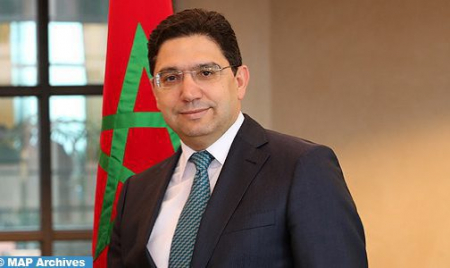African Women Extremely Affected by Climate Change – Morocco’s FM –
African women, who are the backbone of the continent’s food security, are extremely affected by climate change, Minister of Foreign Affairs, African Cooperation and Moroccan Expatriates, Nasser Bourita, said Thursday in Addis Ababa. Speaking at a luncheon discussion on the intersecting challenges of climate change and the Women, Peace and Security Agenda in Africa (WPS), organized by Morocco in collaboration with the African Union, on the sidelines of the 42nd session of the Executive Council of the African Union (AU), Bourita stressed that African women suffer most from conflicts, violence and forced displacement as a result of climate change, noting that they do not fully participate in decision-making processes related to adaptation and mitigation. Emphasizing the leadership of African states in shaping the climate agenda and strengthening women’s participation in this area, Bourita recalled that at the First African Action Summit, chaired by HM King Mohammed VI in Marrakech in 2016, African heads of state committed to promoting the required adaptation policies and measures that are also catalysts for deep structural transformation on the economic and social levels in Africa. “We can only achieve effective adaptation and mitigation if we take into account the gender impacts of climate change and promote women’s participation,” said the Minister, noting that there can be no climate resilience without gender equality, which allows women to fully enjoy their rights in the context of the dramatic impacts of climate change. This meeting on the intersecting challenges of climate change and the WPS Agenda, held at the African Union headquarters, stems from Morocco’s commitment to stimulate new thinking to address Africa’s traditional and emerging challenges and transform them into real opportunities for regional and sub-regional partnerships, he said, noting that the Kingdom is firmly convinced that these challenges should not be a reason for division, but “a catalyst for collective action within our Organization.” While Africa accounts for only 3% of global greenhouse gas emissions, it bears much of the burden of climate change, Bourita said. Noting that climate change is a multiplier of threats in Africa more than in any other region, the Moroccan minister cited HM the King’s speech at the Summit of Heads of State and Government on drought and sustainable land management, held on May 9, 2022, in whichthe Sovereign stressed that “when environmental security is threatened, that affects food security, human security and, in fact, all matters relating to security in general.” This reality can be illustrated through three examples among others, he noted, referring to the increasing demand for water, drought and erratic rainfall that disrupt food systems, with up to 250 million Africans affected by water stress. Second, the continent is experiencing natural disasters at a faster rate than ever before, displacing more than 2.5 million Africans by 2021, he said, adding that the third example is that resource scarcity caused by climate change is giving rise to conflicts between different social groups and providing fertile ground for violent extremism. A holistic approach to human security therefore lays the foundation for synergies between the Climate Agenda and the WPS Agenda, Bourita argued, noting that in this regard, Morocco has always taken the view that the WPS Agenda is not a technical plan, but a political platform and a transformative action program that involves states and other stakeholders, including civil society, academia and the private sector. Welcoming the “considerable” efforts made by African states and the AU in implementing the WPS Agenda at the continental level, he said that “in line with the Royal Vision for the promotion of equality between men and women as the foundation of a modern and democratic society, Morocco’s National Action Plan, launched last March at the UN, is based on a comprehensive approach with the active participation of civil society.” This plan addresses three priority areas, namely preventive diplomacy, mediation, peacekeeping and the promotion of a culture of peace, as well as the economic empowerment of women, he noted, expressing Morocco’s readiness to share its experience in developing its National Action Plan with African countries, within the framework of South-South cooperation, in order to promote national ownership of this agenda. As president of the Peace and Security Council in October 2022, Morocco has launched a fruitful debate on the link between climate change, Covid-19, conflict and gender-based violence, Bourita stressed, saying that strong multilateral cooperation at the AU and UN level is needed to fill the political and normative gap in this area.

